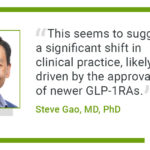November 13, 2025
2 min read
Key takeaways:
- Black and Hispanic individuals were underrepresented in GLP-1 weight loss trials.
- Patients with MASLD and MASH were also underrepresented.
Black and Hispanic individuals with obesity appear underrepresented in GLP-1 weight loss trials, compared with the overall prevalence of obesity in these groups, according to results of a presentation at The Liver Meeting.
Additionally, GLP-1 weight loss trials rarely reported data about participants with steatotic liver disease, and those that did had low representation of these patients, according to researchers.

“As semaglutide and other GLP-1 receptor agonists gain new indications, trial design and health system strategies must prioritize equity to ensure that the transformative benefits of these therapies reach populations who need them most,” Kimberly Ho, MD, internal medicine resident at The Warren Alpert Medical School of Brown University, told Healio.
Ho and colleagues performed a systematic review of 149 clinical trials of GLP-1s for weight loss. Then they performed a meta-analysis of 24 studies, comprising 16,600 participants, to evaluate the demographic makeup of trials and the proportion of participants with metabolic dysfunction-associated steatotic liver disease, metabolic dysfunction-associated steatohepatitis or other lipid disorders.
The analysis included 15 studies based in the United States (n = 12,906) and nine international studies (n = 3,694).
Overall, Ho said white participants were overrepresented, making up 69% of participants in all trials and 75% of U.S. trials. The researchers reported that randomized controlled trials in the U.S. were four times more likely to include white participants (RR = 4.1; 95% CI, 4.05-4.16), compared with international trials.
In contrast, although 50% of Black adults in the U.S. have obesity, Black participants made up just 6% of U.S. trials, which were 15% less likely to include Black participants than international trials (RR = 0.85; 95% CI, 0.74-0.97). Hispanic patients were also underrepresented, comprising 27% of participants in U.S. trials despite obesity prevalence of 45%.
Results also showed patients with MASLD and MASH were underrepresented in trials. According to the researchers, few studies reported data about the prevalence of these liver disorders.
Although the prevalence of MASLD or MASH reaches about 40% in the U.S., according to Ho, only 18% of participants in trials had these conditions. The proportion was even lower in U.S.-based studies: Only 8% of participants in U.S. studies had MASLD or MASH, compared with 26% of those in international studies (RR = 0.34; 95% CI, 0.2-0.49).
“Our findings emphasize the urgent need for broader inclusion of minority groups and systematic incorporation of MASLD/MASH endpoints in GLP-1 randomized controlled trials,” Ho said.
For more information:
Kimberly Ho, MD can be reached at kimberly_ho@brown.edu.











